Two Record Reviews from Dana Paul Perna
Comments Off on Two Record Reviews from Dana Paul PernaJune 22, 2025 by Admin

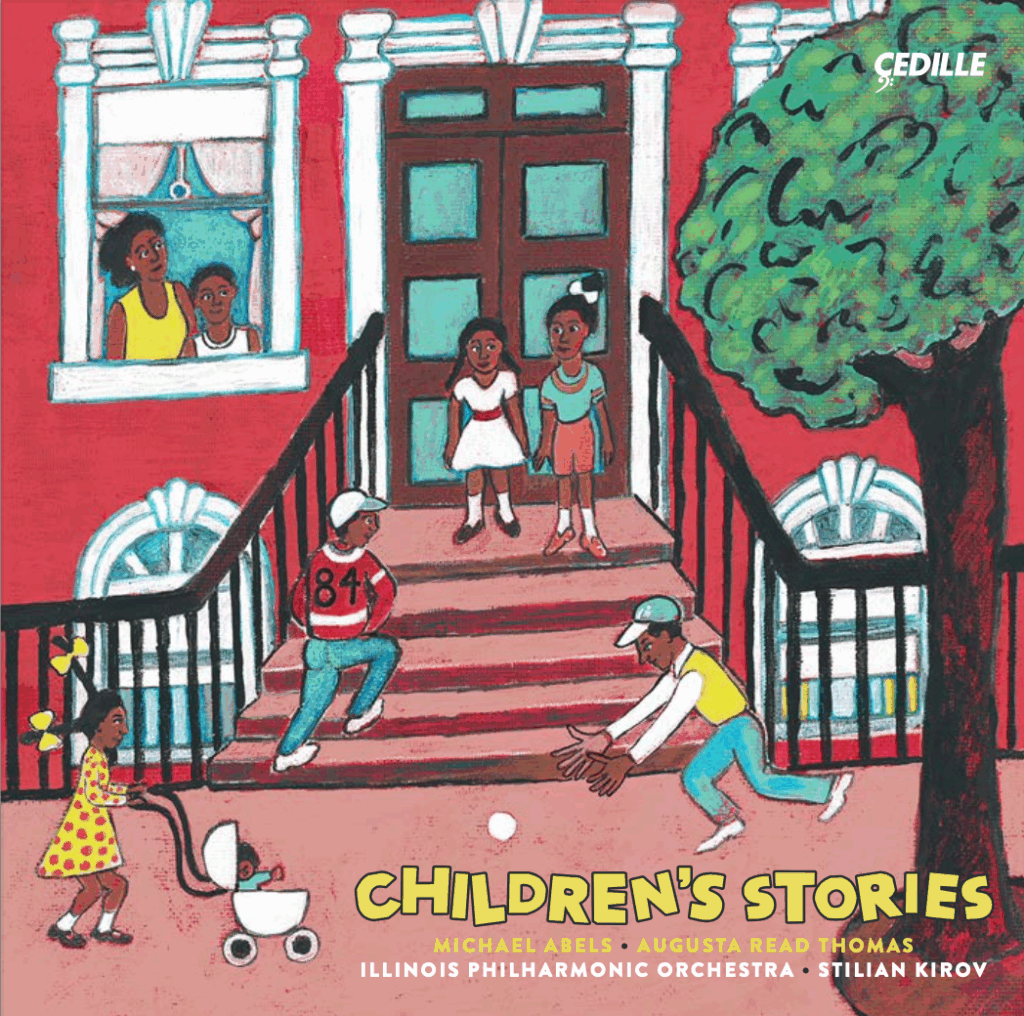 Children’s Stories
Children’s Stories
Illinois Philharmonic Orchestra, Stilian Kirov, conducting
Michael Sumuel, narrator
Anima-Glen Ellyn Children’s Chorus, (Evan Bruno, Artistic Director)
Chicago High School for the Arts (aka ChiArts Chamber Choir, Charles Taylor, Music Director) ,
Michael Abels: Frederick’s Fables
Leo Lionni, author
Augusta Read Thomas: Gwendolyn Brooks Settings
Cedille Records CDR 90000 233
World Premiere recordings of both compositions
Part of the journey towards what would yield this important new release began on March 12, 2022 on which Frederick’s Fables by Michael Abels was recorded. Then, some two more years later, on Saturday, March 16, 2024, the Illinois Philharmonic Orchestra, under the baton of their Music Director, Stilian Kirov presented the World Premiere of Gwendolyn Brooks Settings, a composition for children’s chorus and orchestra by Augusta Read Thomas. They then recorded it the following day (March 17, 2024). With all their source materials properly rendered into a form that could become digitally edited, mastered, and finalized into-and-for a compact disc, Cedille Records (catalog number CDR 90000 233) proceeded to do almost the unimaginable: 1) to internationally release a disc devoted to World Premiere recordings of two highly significant new compositions; 2) to internationally release a disc devoted to music by two living American composers; 3) to internationally release the long awaited debut release by the Illinois Philharmonic Orchestra; and, 4) to internationally release a major symphonic recording that was produced in the United States of America – novel for that fact alone – devoted to music that does not fit the conventions of Country, Pop, or Rock markets.…..you know, music that “suits” would inform you consists of content not viably “commercial enough to turn a profit”.
Yes, you have read everything in that introductory paragraph correctly! Cedille Records did just that, and what a that this one is!!! More than just a release, whether intended for children, children-at-heart, or just plain everyone!, it’s an all-out triumph. There is nothing negative to comment upon in terms of its content. While I pointed out that there are two works on this disc, I did not yet mention that both are major compositions within the outputs of these two living Masters. What do I mean by this? The shortest of the two works (the one by Ms. Thomas) runs a mere 31 minutes on a release that runs 69-and-a-half minutes in total duration. Yes, this is some serious stuff, yet 100% totally engaging for audiences from the cradle to the……oh, I’ll leave the last part of that sentence off; it’s a bit grim, however, if one is heading there, perhaps you can toss a copy of this into the departed’s casket, giving them something to listen to when they reach the other side.
Before I turn to the music, one of the features, and a significant aspect of it that is as important to mention as are the works contained on this CD, is the amount of time and attention that was paid and devoted to its artwork, graphics, and packaging. Past that acknowledgement, those outstanding aspects alone deserve a prize (or two!) since those elements elevate what one is about to listen to, hear, or encounter even before they drop their disc into their CD player.
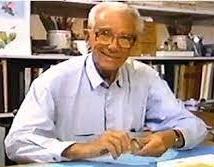
Leo Lionni
Of the two works marking their world premiere on this release, the first of them is Frederick’s Fables, for which the music by Michael Abels creates the orchestral fabric that supports their text by author Leo Lionni. Composed in 1994, Abels was commissioned by the Plymouth Music Series (now VocalEssence) of Minnesota to compose this opus for a performance at which its narrator was James Earl Jones – yes, exactly, him > the voice of CNN, Darth Vader, along with so many other memorable portrayals. In more recent years, past his becoming a recipient of a Pulitzer Prize (shared with Rhiannon Giddens for their co-composed opera Omar), Abels has become best known for his scores for the Jordan Peele feature-length motion pictures Get Out, Us and Nope, which, as you have just read, this opus pre-dates.

Michael Abels
For Frederick’s Fables, Abels was presented with the challenge to compose music in support of Lionni’s text, while not interfering with the narration James Earl Jones, or any narrator for that matter, would be called upon to deliver; in other words, to engage the listener without drawing attention away from the fables. For this reason, plus given the nature for his more current work that has earned him a specific reputation, comparisons to this opus bearing a resemblance to a film score will certainly be levied upon it. This may prove a bit unfair given that the text of these collected fables afforded Abels the opportunity to compose an extended four movement symphonic narrative on its own merit. If anything, Abels’ work reminded me of classic radio (of the 1930’s to 1950’s) when presentations of this nature were prepared for broadcast on a daily basis. While Lionni’s text encompasses every bit of detail laid out in a verbal linear form, Abels matches all of that through his refined sense of orchestration, tightly woven structures within a melodiously symphonic context as these fables proceed forward on their 38 minutes-worth of a journey. It is, therefore, Abels’ music that adds, as it should, plenty of coloration and dimension in places where the words themselves prove to be simply not enough.
Serving as narrator for this release is Michael Sumuel who had big shoes to fill given as this is a full text to deliver. Once the narration begins, there is not a lot of break time. Mr. Sumuel amply delivers it with all the panache, vividness, humor, and sensitivity Lionni’s words require as he brings them fully to life.

Gwendolyn Brooks
After the Abels opus concludes, the second highlight of this recording, Gwendolyn Brooks Settings by composer Augusta Read Thomas follows. For those among you reading this who are interested, Ms. Thomas selected to utilize poems by Gwendolyn Brooks derived from Bronzeville Girls and Boys (1956, published by HarperCollins Publishers): Tommy, Cynthia in The Snow, Robert Who is Often a Stranger to Himself, De Koven, Mexie and Birdie, Marie Lucille, and The Admiration of Willie.
Noted poet, Gwendolyn Brooks became the first Black female to have received the Pulitzer Prize in May 1950 for Annie Allen. Her poetry marks a high benchmark in American Literature; her writings imbued with a sense of purpose, precision, personality, sensitivity, and humanity that remain timeless despite changing tastes, trends, and ethics (or lack there-of in terms of the latter in our present time of unconsciousness). While she was born in Topeka, Kansas in 1917, she only lived there for the first six weeks of her life before her family moved to the Southside of Chicago where Ms. Brooks grew up, and lived for the remainder of her life. It seemed most appropriate that Ms. Brooks’ work, a former University of Chicago faculty member (that marked her first teaching experience), was chosen to serve as the texts with which a current professor at the same institution selected to set to music in such an extended expression, equally as personally drafted as Ms. Brooks penned her poetic locutions. Both Ms. Thomas and Ms. Brooks share another honor in common: both were inducted into the American Academy of Arts and Letters.

Augusta Read Thomas
With all that as a lead in, turning to the composition Augusta Read Thomas forged into being between 2018 to 2020, Gwendolyn Brooks Settings is an expansive tableau in six parts for children’s chorus and orchestra. Once her composition propels itself at its outset, it does not stop until everyone arrives at its final measure. Every aspect of her well crafted opus progresses constantly forward, moving from texture to texture, layering sonorities in contrast with other sonorities, creating a dramatic concoction that she brilliantly formed into a unique hybrid of symphonic song-cycle, soundscape, and symphony. Her use of the chorus is integrated stylistically within its parameters, braiding their participation into a quilt of sound.

Stilian Kirov
Past acknowledging the packaging, up to this point, only the music on this release has been commented upon. Credit must be given to the outstanding musicianship of the Illinois Philharmonic Orchestra; an orchestra that was established in 1954 marking its debut recording with this CD. While the Chicago Symphony Orchestra is the best known orchestra in that state, this Philharmonic, with Illinois in its name, certainly – and strongly – measures up to the high expectations someone would seek, and demand. Stilian Kirov proves to be the Maestro in charge for pulling and supporting all the forces together more than admirably over this entire disc’s worth of mirth and merriment. While Abels and Thomas may be contemporaries, their modus operandi are clearly represented in all their differences of style, approach, and aesthetic, yet perfectly matched by their mutual desire to compose music of absolutely the highest quality. In terms of Ms. Thomas’ work specifically, without the committed work by Anima-Glen Ellyn Children’s Chorus, Chicago High School for the Arts and their directors Evan Bruno, and Charles Taylor, respectively, none of her opus would have been delivered with the desired resonance she – and, most especially, Ms. Brooks’ words – require.
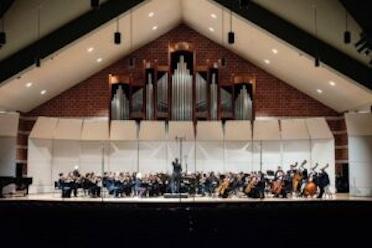
While everything stated should equate for enough reasons to whet ones appetite towards procuring a copy of this, the audio sonics listeners will behold manage to fully capture the nuances inherent to these scores in all their brilliant hues, tints, dynamics and tones. This is a truly important entry in the international catalog of recent releases for which high praise is well deserved, and completely necessary. Important music by two major American composers, delivered by a significant orchestra that has been doing outstanding work in the Prairie for decades, needs to be encouraged and championed as they become exposed – as is warranted – to a wider, global public.
Dana Paul Perna – 18 May 2025
For those interested in this release, and/or the Illinois Philharmonic Orchestra, visit the following website for additional information: https://ipomusic.org/album/.
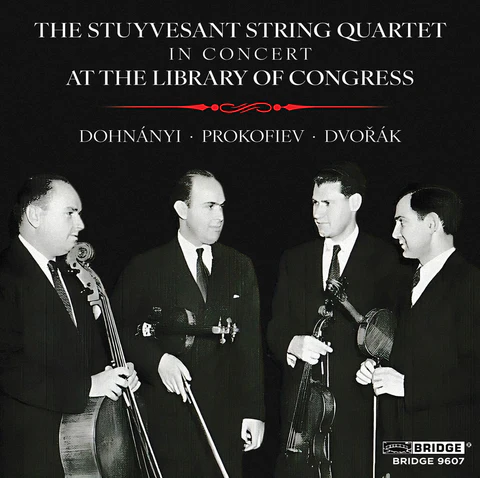
Stuyvesant String Quartet – In Concert at the Library of Congress
Erno Dohnányi (1877-1960): String Quartet No 2 in D-flat major, Op. 15 (1907)
Sergei Prokofiev (1891-1953): String Quartet No 1 in B minor, Op. 50 (1930)
Antonín Dvorák (1841-1904): String Quartet No 12 in F major, Op. 96 ‘American’ (1893)
Bridge Records 9607
Recorded during their live performance on 30 December 1946 at Coolidge Auditorium, Library of Congress, Washington DC
On 30 December 1946, the Stuyvesant String Quartet were recorded live during their performance in the Coolidge Auditorium of the Library of Congress in Washington DC when they presented a concert consisting of string quartets by Erno Dohnányi, Sergei Prokofiev and Antonín Dvorák. As usual for that period, these performances were taken down on lacquers that may (?) have suffered some damage (more reference regarding that later). That they exist at all, allowing them to become restored, digitized and placed onto a CD is rewarding in itself, if not amazing that they were not lost in total.
At the time of this performance, Stuyvesant String Quartet was comprised of Sylvan Shulman and Bernard Robbins, violins, Ralph Hersh, viola, and Alan Shulman, cello. While they had already made commercial recordings in studio settings (radio included), this release allows us to discover them in a completely different light, and situation. For this reason, everything is what it is; no “takes” on any of these selections since what they played on that date remains as it was played, period. To state that everything is perfect would be stating an untruth since there are those moments of a pitch here, or there, that’s not as solid as it could have been if done in a studio, or an environment they may have known better, yet Stuyvesant String Quartet’s playing is most certainly secure and polished on all three of these quartets one will encounter on this fabulous Bridge release.
The first of the three titles was composed by Erno Dohnányi (1877-1960), his “String Quartet No 2 in D-flat major, Op. 15”. Keep in mind that, while this quartet was completed in 1907, its composer was still alive, and active when this performance was presented. Given the period of composition, its three movements contain many late Romantic gestures as one were to find in any of Dohnányi’s contemporaries, presented in a very direct manner by Stuyvesant here. This is not to imply it is a performance devoid of majesty. Far from being sterile, when the music demands lyricism, nobility and intensity, Stuyvesant String Quartet delivered exactly what was/is necessary while capturing all the dynamic spectrum structurally laid out by Dohnányi’s hand.
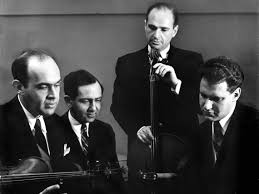
Following the nearly 27 minute Dohnányi opus comes “String Quartet No 1 in B minor, Op. 50” by Sergei Prokofiev (1891-1953). Completed in 1930, in three movements, it had been premiered by the Brosa Quartet in 1931 and the Stuyvesant players respond well to its acerbity and terse lyricism – that characteristic “sarcasm” Prokofiev remains known for….and, yes, in case this thought has crossed your mind as well, similar to Dohnányi, at the time of this performance, Prokofiev was still alive and active. Opening with a steady, driving rhythm in support of a melody stylistically reminiscent of his “Classical Symphony” in its first movement, it’s this work’s pivotal finale which marks its focal point; an “Andante” of gravity and pathos, which finds Stuyvesant at its peak, expressing unified melancholy through a very vocalized sound.
Closing out this trio of string quartets is “String Quartet No 12 in F major, Op. 96” ‘American’ by Antonín Dvo?ák, rendered in a fine performance by Stuyvesant String Quartet of this war-horse among chamber music’s literature. With this, the most appropriately perfect quartet with which to conclude their program, particularly given the location and occasion as per where it occurred, the elegant buoyancy of this rendition, coupled by some truly splendid sonorities in the slow movement, are something to be fully savored as a highlight of Stuyvesant’s presentation of this most performed among Dvo?ák’s canon of quartets.
Booklet notes for this Bridge release consist of the authorship of Jay Shulman, who supplied the profile on Stuyvesant String Quartet, and Laurie Shulman who supplied annotation regarding the music performed. As stated earlier, the lacquers used may have suffered some damage over time, but it seems minimal when the sum total of its parts became developed into this final digitized form. Credit is given to the Music Division of the Library of Congress for having prepared the lacquer-to-tape transfers used on this release making their further restoration possible towards issue. For those interested in historical performances to add to their collection, this release is highly recommended. For those of you who may be looking for something to listen to that is a bit out of the ordinary, you may also find considerable pleasure in checking this one out.
For further information regarding this release, here are a couple of links that may prove helpful:
For Stuyvesant String Quartet, visit Alan Shulman’s website: https://alanshulman.com/.
For Bridge Records, and information regarding their Stuyvesant String Quartet recordings appearing on that label, go to https://bridgerecords.com/.
Dana Paul Perna
27 May 2025
Category Sound | Tags:
Comments Off on Two Record Reviews from Dana Paul Perna
Sorry, comments are closed.

